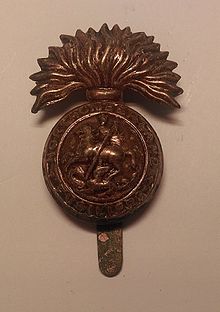
Back نورثامبرلاند فيوسليرز الملكيون Arabic Regimiento n.º 5 de Infantería Spanish 5 Pułk Piechoty (brytyjski) Polish Королевский нортумберлендский фузилёрный полк Russian 皇家诺森柏兰燧发枪团 Chinese
| 5th (Northumberland) Regiment of Foot Northumberland Fusiliers Royal Northumberland Fusiliers | |
|---|---|
 Cap badge of the Northumberland Fusiliers. | |
| Active | 1674–1968 |
| Country | |
| Branch | |
| Type | Line infantry |
| Role | Fusiliers |
| Size | First World War: 52 battalions Second World War: 10 battalions |
| Garrison/HQ | Fenham Barracks, Newcastle upon Tyne |
| Nickname(s) | The Fighting 5th 5th of Foot The Old and Bold[1] Wellington's Bodyguard[1] |
| Motto(s) | Quo Fata Vocant (Whither the Fates call) |
| Colors | Gosling green facings |
| Anniversaries | St Georges Day 23 April |
| Commanders | |
| Notable commanders | Robert Leith-Macgregor (1st Battalion, 1960–62) |
| Insignia | |
| Hackle | Red over White |
The Royal Northumberland Fusiliers was an infantry regiment of the British Army. Raised in 1674 as one of three 'English' units in the Dutch Anglo-Scots Brigade, it accompanied William III to England in the November 1688 Glorious Revolution and became part of the English establishment in 1689.
In 1751, it became the 5th Regiment of Foot, with the regional title 'Northumberland' added in 1782; in 1836, it was designated a Fusilier unit and became the 5th (Northumberland Fusiliers) Regiment of Foot.
After the 1881 Childers Reforms, it adopted the title Northumberland Fusiliers, then Royal Northumberland Fusiliers on 3 June 1935. In 1968, it was amalgamated with the Royal Fusiliers (City of London Regiment), the Royal Warwickshire Fusiliers and Lancashire Fusiliers to form the present Royal Regiment of Fusiliers.
- ^ a b Burnham, Robert; McGuigan, Ron (2010). The British Army against Napoleon. Barnsley, South Yorkshire: Frontline Books. p. 124. ISBN 978-1-84832-562-3.